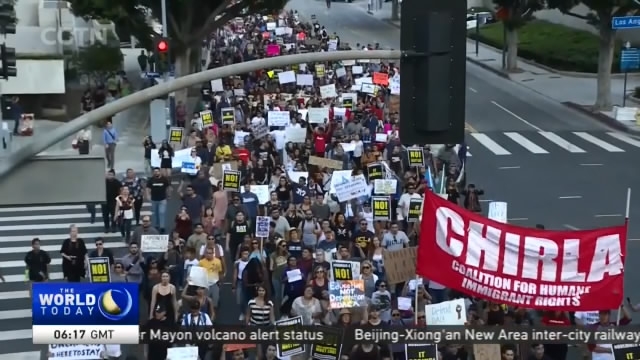
15:04, 06-Mar-2018
US Immigration Policy: Honduran DACA recipient appeals for extension past March 5th

Monday was supposed to be the deadline for the Deferred Action for Childhood Arrivals program in the United States. It temporarily shields hundreds of thousands of undocumented young people - known as Dreamers - from deportation. In September, President Trump announced that he was ending DACA, and called on Congress to fix it. But a bipartisan effort failed. Now, court decisions are forcing the Trump administration to keep renewing DACA permits. Roee Ruttenberg spoke to one "Dreamer" from Honduras whose fate is once again -- up in the air.
Thirty-year-old Ilsy Bu was born in Honduras. She came to the U.S. on a tourist visa when she was 12 and never went back.
She was 16 when she started working - illegally. She couldn't keep a job long -- eventually her immigration status always came up.
ILSY BU HONDURAN DACA RECIPIENT "Just to get a raise, or to get a better promotion. I had to take those ideas out of my head because I knew that eventually I had to leave the job."
In 2012, that all changed. Ilsy signed up for DACA - the Deferred Action for Childhood Arrivals. The Obama-era initiative gave Ilsy temporary stay - and the right to work.
ILSY BU HONDURAN DACA RECIPIENT "I cried. It was just something that started your tears just start coming down, because I just felt this relief, like this heavy weight off my shoulder. Now I could walk freely."
Per DACA's requirements, Ilsy had to re-enroll every two years.
Last summer, she says, the NGOs that were supposed to help her declined to do so. This, as the Trump administration warned it'd be ending the DACA program.
Ilsy says - without papers - she lost her job. With no income, she gave up her apartment and had to quit college.
ILSY BU HONDURAN DACA RECIPIENT "It felt like my life - these 17 years - meant nothing. Like I had to go back into the shadows."
In January, a federal judge blocked White House plans to reject re-enrollments. Last month, the Supreme Court refused to hear the government's appeal.
That opened the door for Ilsy to re-enroll in DACA. She's now waiting her new paperwork.
ROEE RUTTENBERG WASHINGTON "Ilsy, what do you say to be people who say that you jumped the line, that you cut in front of people who were waiting to come to the U.S. legally, and that you could now go back to Honduras."
ILSY BU HONDURAN DACA RECIPIENT "That's not how the world works. People get out of their country to survive and because they realized that my life wasn't just to stay here when there are other nations out there where you can make it in. If there's going to be a struggle, you're going to have to pay a price. And me leaving this country, and going back to Hondorus, and then closing the doors on not being able to come back here then I think of the struggle, the sacrifice, my parents and my grandparents made just to bring me here. That would just be automatically throwing into the trash."
She says: one day, she will go back to Honduras where she plans to run for public office. Roee Ruttenberg, CGTN, in Washington.

SITEMAP
Copyright © 2018 CGTN. Beijing ICP prepared NO.16065310-3
Copyright © 2018 CGTN. Beijing ICP prepared NO.16065310-3